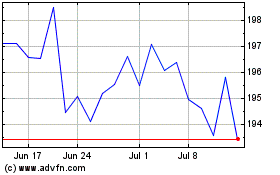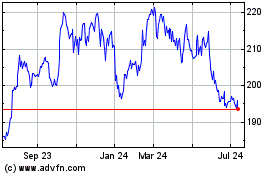Top Economists Paint Bleak Picture For US Economy; Rap Fed
January 07 2011 - 4:55PM
Dow Jones News
Top economists offer different diagnoses on what's wrong with
the U.S. economy, but they agree on one thing: the prospects look
pretty bad.
Many economists meeting here for the annual conference of the
American Economic Association believe the Federal Reserve has not
done a good job in steering the economy, with at least one
predicting the Chinese yuan will supplant the U.S. dollar as the
world's dominant currency.
"The age of American predominance is over," said Simon Johnson,
a professor at the Massachusetts Institute of Technology and
formerly a top economist at the International Monetary Fund. He
believes the yuan will become the world's reserve currency in two
decades. The global financial crisis caused by the U.S. never
ended, he told a panel on the causes of the crisis, because big and
powerful banks can still bring down the U.S. economy by going
under.
John Cochrane, an economist from the University of Chicago, said
he believes the financial crisis is over. But he fears the outcome
will be "goodbye financial crisis, hello sovereign debt crisis," he
said, warning that California may become for the U.S. what Greece
was for Europe.
Myron Scholes, the Nobel-prize winning economist on the board of
futures market CME Group Inc. (CME), believes that now that banks
are semi-public institutions, innovation will suffer and, with it,
the economy.
Raghuram Rajan, another University of Chicago professor who was
a senior IMF economist, believes the U.S. will continue to be a
"prime mover in financial markets for a long time." But he agrees
that the age of U.S. dominance in the world economy is nearing an
end.
Rajan said the U.S. central bank contributed to the recent
crisis by encouraging risk-taking with low interest rates, and is
skeptical of the Fed's latest attempt to boost the economy by
buying government debt.
Fed Chairman Ben Bernanke Friday offered a slightly better
outlook for the economy, but speaking after data showed the
unemployment rate plunged to its lowest point in 19 months at 9.4%,
cautioned the improvement in the labor market will be slow. He once
again defended the central bank's bond purchases, saying the Fed
has the tools to pull the money back at the right time to prevent
inflation.
Several economists question this point. The Fed's easy money
policy is a "serious mistake," said Ronald McKinnon, a professor at
Stanford University, who is presenting a paper here.
By driving rates so low the Fed has made the global economy less
stable, the paper argues, leading to beggar-thy-neighbor policies
reminiscent of the international currency chaos that worsened the
1930s Great Depression, with the end result possibly high inflation
around the world.
The Fed's line is that, had it not slashed short-term rates
close to zero to fight the financial crisis at the end of 2008 and
kept long-term rates low by buying bonds, consumer spending and
business investments would have collapsed, plunging the economy
into a new depression.
The Fed's latest effort to boost the economy by buying $600
billion government bonds, which started in November 2010 and is due
to run through June, has led countries from Germany to Brazil to
accuse the U.S. of igniting a currency war by depreciating the
dollar. The Fed counters its aim is to keep borrowing rates low and
drive investors into riskier assets like stocks so that the world's
largest economy can continue to recover from a deep recession,
something that will benefit all countries.
But a byproduct of the Fed's decision is a weak dollar and lower
yields for U.S. assets, prompting an outflow of money from the U.S.
as investors search higher returns into the rapidly-growing
economies of emerging countries. To prevent their own currencies
from rising excessively, countries like Brazil and Mexico have
bought dollars with real and peso, forcing their own interest rates
down and inflation up.
McKinnon drew a parallel with the policies the U.S. followed
under President Nixon in the early 1970s, when an easy U.S.
monetary policy accompanied by a weakening dollar forced other
industrial countries to appreciate their currencies against the
dollar.
"If most peripheral central banks expand simultaneously, the
result is generalized worldwide inflation," the economist said.
-By Luca Di Leo, Dow Jones Newswires; 202 862 6682;
luca.dileo@dowjones.com
CME (NASDAQ:CME)
Historical Stock Chart
From May 2024 to Jun 2024

CME (NASDAQ:CME)
Historical Stock Chart
From Jun 2023 to Jun 2024
